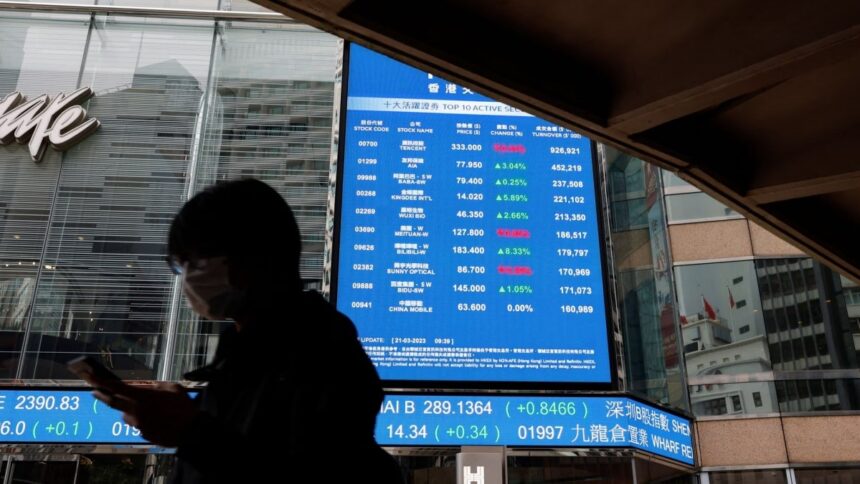Asian shares fell and the dollar was firm on Monday as investors looked ahead to a week packed with central bank meetings including the Federal Reserve and the Bank of Japan, which will be closely scrutinised for the global monetary policy outlook.
S&P 500 futures advanced 0.2% while Nasdaq futures edged 0.1% higher.
MSCI’s broadest index of Asia-Pacific shares outside Japan fell 0.5%, with Australia’s resources-heavy share market dropping 0.7% and Hong Kong’s Hang Seng index off 0.7%.
Japan’s Nikkei is closed for a holiday.
The spotlight in the Asian morning fell on Chinese property developers listed in Hong Kong, which tumbled 2% in part due to a 20% plunge in China Evergrande Group after police in southern China detained some staff at its wealth management unit, the latest trouble to hit the embattled property firm.
Also, Chinese trust firm Zhongrong International Trust Co, with exposure to Chinese property developers, said over the weekend it was unable to make payments on some trust products on time.
Sentiment in Asia had improved last week after news of more policy support from Beijing and better-than-expected Chinese data added to signs the world’s second-largest economy could be starting to stabilise from a months-long slowdown.
“Despite the encouraging sign of stabilization, the property market continues to be the missing puzzle piece in the economic picture,” said Tommy Xie, head of Greater China Research at OCBC Bank.
“The on-the-ground feedback indicates a rise in property viewing activities; however, most prospective buyers are not in a hurry to finalize deals due to the increasing supply of apartments post relaxation.”
This week, global central banks will take centre stage, with five of those overseeing the 10 most heavily traded currencies – including the U.S. Federal Reserve – holding rate-setting meetings, plus a swathe of emerging market ones as well.
Markets are fully priced for a pause from the Fed on Wednesday, so the focus will be on the updated economic and rates projections, as well as what Chair Jerome Powell says about the future. They see about 80 basis points of cuts next year.
“In theory, the FOMC meeting should be a low-volatility affair, but it is a risk that needs to be managed,” said Chris Weston, head of research at Pepperstone.
“We should see the median projection for the 2023 fed funds rate remaining at 5.6%, offering the bank the flexibility to hike again in November, should the data warrant it.”
Weston added that if the Fed revises up the rate projections for 2024, that would see rate cuts being priced out, resulting in renewed interests in the U.S. dollar and downward pressure on global shares.
On Thursday, Bank of England is tipped to hike for the 15th time and take benchmark borrowing costs to 5.5%, while Sweden’s Riksbank is seen hiking by 25 basis points to 4%.
Bank of Japan is the key risk event on Friday. Markets are looking for any signs that the BOJ could be moving away from its ultra-loose policy faster than previously thought, after recent comments by Governor Kazuo Ueda sent yields much higher.
Last Friday, Wall Street ended sharply lower as U.S. industrial labour action weighed on auto shares. Rising Treasury yields also pressured Amazon and other megacap growth companies.
Cash Treasuries were not traded in Asia with Tokyo shut. Treasury yields edged higher on Friday, with the two-year above the 5% threshold, as futures price in higher rates for longer ahead of a the Fed’s policy meeting this week.
In the currency markets, the U.S. dollar was still standing strong near its six-month top at 105.29 against a basket of major currencies.
The euro recovered 0.1% to $1.0673 in early Asia trade, after slumping to a 3-1/2 month low of $1.0629 last week as the European Central Bank signalled its rate hikes could be over.
Oil prices were higher, after hitting 10 month tops last Friday, stoking inflationary pressures. Brent crude futures rose 0.3% at $94.20 per barrel and U.S. West Texas Intermediate crude futures were up 0.4% at $91.14.
The gold price was 0.2% higher at $1,925.62 per ounce.








